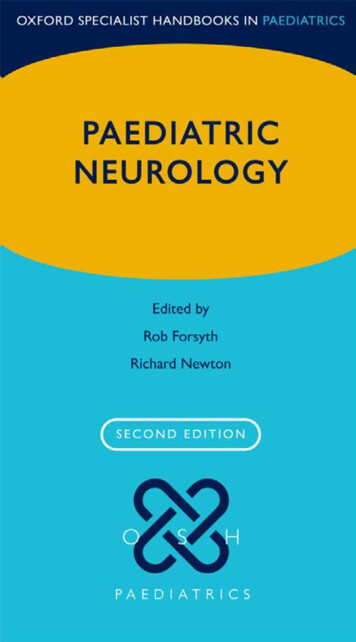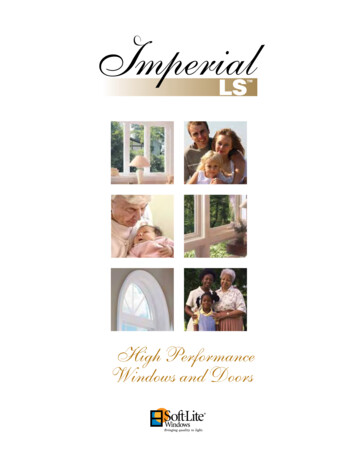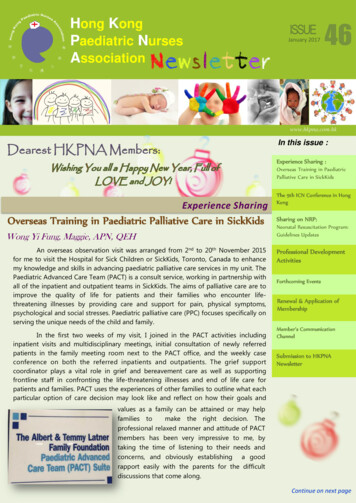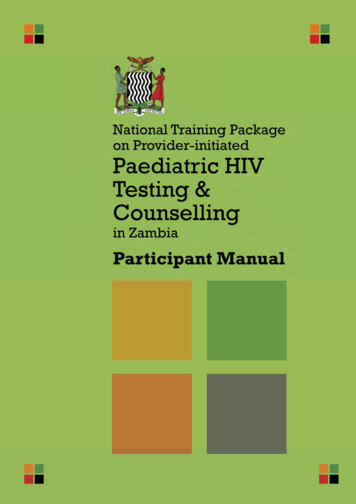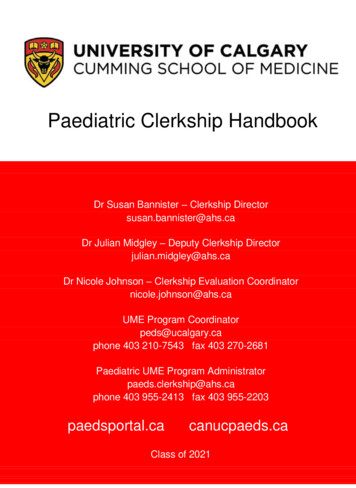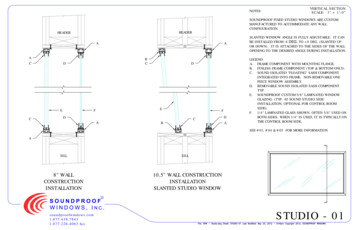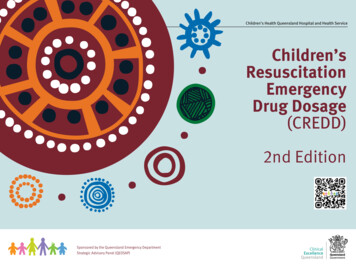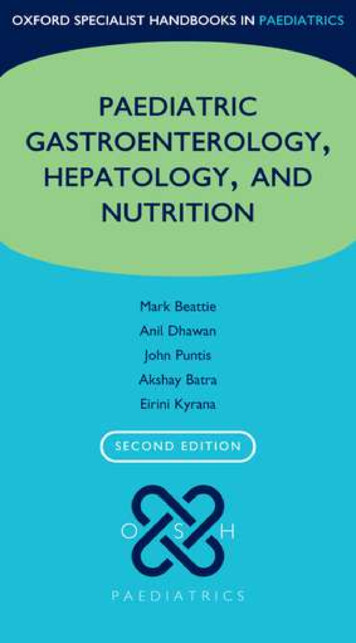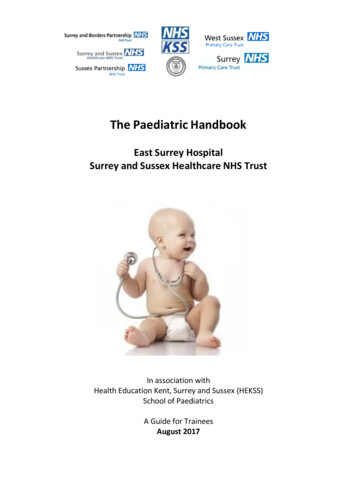
Transcription
The Paediatric HandbookEast Surrey HospitalSurrey and Sussex Healthcare NHS TrustIn association withHealth Education Kent, Surrey and Sussex (HEKSS)School of PaediatricsA Guide for TraineesAugust 2017
Index1. Introduction2. Surrey & Sussex NHS Trust3. Key people in Paediatrics4. Your Paediatric Supervisor5. Educational & Clinical Supervisors6. Paediatric Consultants at SASH7. Community Paediatrics8. Community Nursing Teams9. Specialist Nurses in Paediatrics10. Safeguarding Children’s Nurses11. Working in Paediatrics12. Your Role as a Learner13. E-portfolio & Asset14. WPBA/ SLE15. Paediatric Curriculum for Speciality Trainees16. Regional study days and HEKSS School of Paediatrics17. Paediatrics run-through training18. MRCPCH Examinations19. Paediatric Curriculum for GPST and ED doctors20. The Local Faculty Group21. Trainee Representatives22. Local Academic Board23. Library24. Junior Doctors25. Rotas26. Less Than Full Time Training27. Study Leave28. Annual Leave29. Sick Leave30. Local Teaching Programme31. Monthly Teaching Rota32. Trainee Case Presentations33. Feedback forms34. Outpatient Clinic Timetables35. Specialist Visiting Clinics36. Paediatric Secretaries37. Useful Telephone Numbers2
1. INTRODUCTION:Welcome to the Paediatric Department. This handbook is written for new paediatric junior doctorsin order to familiarise you with the people, place and procedures in preparation for your first day.This Handbook contains all kinds of departmental information, but is especially helpful for those ofyou on the Paediatric Speciality Training programme. It should be read in conjunction with yourspecific curriculum (found on your Royal College website) and your Specialty School Handbook.This document is updated regularly to reflect changes that have occurred within thedepartment, if you find any errors or mistakes please inform Dr Dymond, the RCPCH Tutor forpaediatrics.2. SURREY & SUSSEX NHS TRUST:We are located just south of the M25, off the M23, close to Gatwick Airport. We provideemergency and non-emergency services to the residents of East Surrey, north-east West Sussex,and South Croydon, including the major towns of Crawley, Horsham, Reigate and Redhill.We provide acute and complex services at East Surrey Hospital in Redhill. We also have severaloutreach hospitals for a range of outpatient, diagnostic and less complex planned services.The Post Graduate Education Centre (PGEC) is located in the Trust Headquarters building, at theWest entrance of the hospital.The main paediatric areas are Outwood Children’s ward, Child Assessment Unit and the NeonatalUnit or SCBU, all of which are situated on the first floor of East Wing. Paediatric Outpatients issituated in a purpose built unit outside East entrance, opposite the staff car park.3. KEY PEOPLE IN PAEDIATRICSThe Clinical Lead for Paediatrics is Dr Catherine Greenaway, email:Catherine.greenaway@sash.nhs.uk Her secretary is Sally Ann Taylor ext. 1759. Absences, rotaissues, and health problems affecting your clinical duties, study leave issues, grievances, and anydepartmental or staffing concerns especially those relating to patient safety need to be brought toher attention. Dr Greenaway investigates all clinical incidents reported on Datix, arranges locumsand recruits permanent medical staff; she oversees the department on a day to day basis. Shehelps and advises the Rota Co-ordinators across all levels of staff.The Interim RCPCH Tutor is Dr Debbie Pullen, email: Debbie.Pullen@sash.nhs.uk Her secretary isSarah Dalton ext. 2645.Training issues e.g. working Less Than Full Time, competency achievements, the educationprogramme, study leave issues, problems with e-portfolio, ARCP’s, issues with your educational/clinical supervisors should be brought to the Tutors attention. Dr Pullen advises and aids the SHOrota co-ordinators and runs the Junior Senior monthly meeting.The PGEC administrator for Paediatrics & for all GP trainees within SASH is Mr Iain Buchanan, ext.2936. Email: Iain.buchanan@sash.nhs.uk . The PGEC staff have admin rights to the variousspeciality e-portfolio systems, they compile attendance registers and feedback forms for teaching.Iain organises and minutes both the Paediatric and GP Local Faculty Group (LFG) meetings in whichtraining and education and trainee progress are discussed. LFG meetings are held every Feb, Juneand November in preparation for GP trainee changeover dates.Iain manages GPST1 and GPST2 trainee Hospital rotations and the GP ST3 practice placements, heco-ordinates the Yearly GP Timetable and Training Scheme as a whole, as well as organising
education for the greater GP community such as the annual GP safeguarding Level 3 training, Iainworks closely with the GP TPD’s, the GP Tutor, the Deanery and the GP school to ensure that GPtrainees gain the best possible education here at the trust.The Medical Education Manager is Ms Tina Suttle-Smith, based in the PGEC ext. 6615, email:Tina.Suttle-Smith@sash.nhs.uk. Tina manages everything to do with doctors training andcurriculum delivery across the trust for all specialities. Her brief is to ensure that patient safety ismaintained whilst balancing training needs with service delivery for our junior doctors.Tina is the link between us at SASH and external professional bodies such as HEKSS, SpecialitySchools, the GMC, and the Royal Colleges.Any concerns that trainees may have which they feel unable to address within their speciality canbe taken to Tina for investigation and action. Examples would include bullying, concerns aboutconsultant behaviours, harassment or discrimination.Tina is the Academic Registrar for the Local Academic Board and works closely with the Chief ofEducation Dr Sarah Rafferty, and all the College Tutors who attend the LAB meetings.4. YOUR PAEDIATRIC SUPERVISOR:You will be given a consultant as your named Supervisor for Paediatrics. You need to have anInduction meeting within 2 weeks of starting in the post followed by 1-2 further meetings, usuallyone midterm and one before the placement ends.If you are with us for a long period e.g. for 12 month posts, you may meet more frequently, asrequired, to discuss any additional issues or for a particular project e.g. audit/ leadership tasks.If you are in your last rotation of the year e.g. FY2 final rotation, you may need to have your End ofPlacement Trainers Report completed shortly after starting in the post due to programmedeadlines. We will clearly comply with this however you still need to have a final meeting with yourClinical Supervisor before the actual end of your rotation to give you a more comprehensivesummary of your time in paediatrics. Any concerns raised, even at this stage, will be fed back toyour respective Training Programme Director and to HEKSS.5. EDUCATIONAL AND CLINICAL SUPERVISORSAs a paediatric Specialty Trainee (ST) you will be allocated an Educational Supervisor from thepaediatric consultant body, to mentor and guide your career decisions, help set a PersonalDevelopment Plan (PDP), to hold regular Supervision Meetings and to complete a Trainers Reportsat the end of your post. Your Educational Supervisor will have full access to your Kaizen eportfolioaccount, and can generate new events for you without a ticker request. You will not need aseparate named Clinical Supervisor. Having worked with you during your post, your EducationalSupervisor can also complete the Clinical Supervisors section of the End of Post Trainers Report.If you are a GP trainee, your GP Trainer acts as your Educational Supervisor for the whole 12months, even when you are in hospital placements. Thus you will only be allocated a namedClinical Supervisor from the paediatric consultants. This Supervisor will meet with you regularly forfeedback and do your End of Placement Trainers Report. They do not have access to your eportfolio account and need a ticket request to fill in any formal paperwork.For Foundation/ Broad Based Trainees/ ED CT3s you will have an Educational Supervisor allocatedto you by your speciality so we will give you a named Clinical Supervisor in paediatrics. This
consultant will mentor and guide you, appraise you during your placement and do your End ofPlacement Trainers Report.In practice all trainees will work clinically with all different consultants as you rotate across thevarious areas in paediatrics. You will work closest with the attending consultants in the 3 clinicalareas: Outwood ward, SCBU and CAU, so this is the best opportunity for you to present cases andget your assessments done.6. PAEDIATRIC CONSULTANTS AT SASHDr Catherine GreenawayClinical Lead for PaediatricsInterests Respiratory & Allergy, CF,TB, Neonatal attending consultantDr Debbie PullenInterim RCPCH TutorInterests: EndocrinologyNeonatal attending consultantDr Ivor Lewis (part time) Interests: DiabetesOutpatient sessions onlyDr Bindu RadhaInterests: Fetal MedicineNeonatal attending consultantDr Majeed JawadInterests: Cardiology, Respiratory & Allergy.Chief Examiner for the RCPCHCAU attending consultantDr Abdul Khader:Lead for Neonatal Intensive CareNeonatal attending consultant
Dr Kamal KhoobarryLead for Paediatric OncologyNeonatal attending consultantDr Neemisha JainInterest in DiabetesA&E liaison and CAU leadJoint Simulation LeadCAU attending consultantDr Avinash AravamudhanSpecial interest in DiabetesNeonatal attending consultantDr Yekta Dymond (Maternity Leave) RCPCH Tutor(part time)Joint Named Doctor for SafeguardingCAU attending consultantDr Katherine (Katie) McGlone (part-time)Joint Named Doctor for SafeguardingRheumatology interestCAU attending consultantDr Karen AnsellEpilepsy & Neurology interestsJoint Lead for SimulationCAU attending consultantDr Falak Gurreebun (maternity leave)Interests: Gastroenterology,Medical Student Co-Ordinator,CAU attending consultant
Dr Faheem AkhtarFixed Term Consultant PaediatricianSome resident night shiftsCAU attending consultantDr Noleen SmithFixed Term Consultant PaediatricianSome resident night shiftsCAU attending consultantDr Lola Adenuga (Locum)Interests: gastroenterologyCAU attending consultantDr Silvia Pierini (Locum P/T)CAU attending consultant7. COMMUNITY PAEDIATRICSThe community base for West Sussex is the Child Development Centre situated within CrawleyHospital. Our Crawley community ST4 works daytime shifts in Crawley CDC and provides out ofhours on-calls at East Surrey Hospital.Dr Patricia Atkinson is the clinical Lead for Crawley CDC. She is also the Safeguarding Lead for WestSussex community paeds. Patricia.atkinson1@nhs.net Her secretary is Clare Wilson Tel 01293 600300 ext. 3351The community base for Surrey children is the Community Child Health Centre, Maple House, EastSurrey Hospital. Dr Paul Wright is the Clinical lead and Safeguarding Lead.8. COMMUNITY NURSING TEAMSTeams of children’s community nurses help look after our chronic patients within their home e.g.gastrostomy /tracheostomy patients, complex disabilities, children on chemotherapy, oxygendependent children, those with life limiting conditions, and diabetics, to name a few conditions.The Surrey Community nurses are based in St Johns Court in Redhill, the West Sussex Nurses arebased in Jumbo Children’s Unit, Crawley Hospital. The ward staff have full contact details for allthe community children’s nurses.9. SPECIALIST NURSES IN PAEDIATRICSWe have the following specialist children nurses working at East Surrey Hospital, as part of the inhouse team to deliver best clinical care for our chronic patients: Oncology Nurse, Epilepsy Nurse,Allergy and Asthma nurse, TB and CF nurse, Diabetic nurses, Neonatal Outreach Nurse. We alsohave 2 dedicated paediatric phlebotomists working on the Child Assessment Unit for paediatricblood tests. Appointments are booked in a diary via CAU.
Blood tests on children can be done in Crawley Hospital main phlebotomy, via a bookedappointment system, for children 2yrs old. Families must contact them direct.
10. SAFEGUARDING CHILDREN’S NURSESVicky Abbott and Sally Stimpson are our safeguarding children’s nurses, based in an office in CAU,ext. 2642, bleep 850. They should be contacted for advice on all safeguarding cases whether on theward or previously seen and discharged from A&E. They can advise on all kinds of childsafeguarding issues e.g. infant of a known substance misuser, Looked After Children, Unexplainedinjuries presenting acutely. Please seek them out to discuss any issues that are sensitive or difficultto voice with your seniors, e.g when differences in opinion exist over what could be physical abuserather than accidental injury. The SG nurses work closely with the Named Doctors for SG children.Our SG nurses have very close links to Social Services, midwifery teams, Health visitors and A&Eand are very experienced in all matters especially Child Protection Plans, Child protectionproceedings, Strategy meetings and Case Conferences.They can signpost you to appropriate referral paperwork, contact and fax numbers for socialservices, they can make enquiries with schools, HV, or other professionals on your behalf and arevery friendly and approachable. There is a digital camera locked in the SG office which is there totake photos of safeguarding cases eg marks or injuries seen during the acute presentation, even ifout of hours. Keys to the SG office are held in CAU (Eiffel Tower keyring). Please follow theinstructions for identifying whose photos they are and get a photography consent form signed bythe parents.11. WORKING IN PAEDIATRICSThe aims and objectives of your Paediatric placement is to gain the following:Knowledge and understanding of disease in childrenRecognise the sick child and neonateCompassion and respect for children and their familiesTo serve the best interest of the child or young personApply evidence based knowledge to practice12. YOUR ROLE AS A LEARNERYou are responsible for your own learning andprofessionally by attending appropriate courses andplan your study leave giving at least 6 weeks’ noticeregular meetings with your supervisor, maintainassessments as required for your ARCP.should actively seek to further developcompleting your examinations. You shouldof your intentions. Please ensure you haveyour e-portfolio, keep up to date withIt is your responsibility to request a meeting with your Educational Supervisor In order to completean End of Placement Trainers Report. This is essential for your Annual Review of CompetencyProgression (ARCP). Please note that the deadline for Paediatric ARCPs is end of July, a time whenlots of consultants take Annual Leave and are unavailable.13. E-PORTFOLIOThe new Kaizen e-portfolio for paediatrics launched in Jan 2016, combining the previous Eportfolio and Asset. It is your responsibility to maintain an E-portfolio with reflections, learninglogs, WPBA’s and to upload certificates, CVs, and evidence of your achievements. This is anessential requirement for trainees as it provides an audit of your progress and learning.E-Portfolio accounts are created for users by the affiliated training body (such as a Royal College)when entering a training programme. Paediatric Trust Doctors e.g. LAS/Service posts can getaccess to Kaizen E-portfolio by subscribing to the RCPCH as a non-run through trainee.
14. WORK PLACE BASED ASSESSMENTS (WPBA)/SUPERVISED LEARNING EVENTS(SLE)The RCPCH guide to WPBA’s for trainees and the number needed for each stage of training can befound at this Handover, Ward Rounds and the weekly Grand Round are good opportunities to learn and to buildon differential diagnoses. Please use the ward round as an opportunity to identify patients forwhom you would like a WPBA/ SLE completed.15. PAEDIATRIC CURRICULUM FOR SPECIALITY TRAINEES:The full curriculum for paediatric training can be found lum.pdfIn Paediatrics it is important for you to work with other health care professionals and to attendmulti-professional meetings e.g safeguarding strategy meetings with Social Services. This can be asan observer for junior trainees and as active participants for more senior trainees. It is alsovaluable experience to see Speciality clinics such as the CF clinic or Diabetes clinics in progress asthey will have specialist nurses in attendance, with care centred on the patient.16. REGIONAL STUDY DAYS AND HEKSS SCHOOL OF PAEDIATRICS The website for the KSS Schoolof Paediatrics is /Information on educational opportunities available regionally for ST1-8 paediatric trainees is to befound at /teaching-learning/Please note this website is not well maintained and in fact events are advertised to trainees via amobile App called Eventbrite which is free and which emails you alerts with courses, which you canjust click and book onto.At East Surrey Hospital we run a Simulation day called Communication and Breaking Bad News forall levels of trainees ST1-8 twice a year. This course involves role playing communication sceneswith actors and handling difficult conversations with families. It has been very popular so pleasebook early to avoid disappointment.17. PAEDIATRIC RUN-THROUGH TRAINING Level 1 (ST1-3) - lasts 2-3 yearsProvide basic knowledge of paediatrics and child health, with placements mainly in generalpaediatrics and neonatal intensive care.Completion of the full MRCPCH exams will be necessary to progress into the next level of trainingat ST4 - more about MRCPCH examinations.Level 2 (ST 4-5) - lasts 2 yearsMiddle grade training is provided mainly in district general hospitals (DGHs), using existing coretraining posts and rotations including community paediatrics and neonatology.There is a greater emphasis on outpatient learning, and an expectation of a higher level ofperformance in relation to common paediatric conditions, child development and safeguarding.
Level 3 (ST6-8) - lasts 2-3 yearsTrainees may choose to stay on in general paediatrics, or apply in competition for one of the 17accredited sub-specialties via the Paediatric Grid.Entry to a sub-specialty takes place at ST6 or ST7, depending on the sub-specialty curriculum.Trainees continuing in general paediatrics will be matched to ST 6 - ST8 posts by their local TrainingProgramme Directors (TPDs) in accordance with local availability of training opportunities, traineerequirements and preferences.18. MRCPCH EXAMINATIONSPaediatric trainees should aim to sit their MRCPCH written exams in ST1-2 years, such that theycan be on track to pass their clinical MRCPCH exams by the end of ST3 year in order to progress inthe programme. The training programme is competency based, so if a trainee has not passed fullMRCPCH by completion of ST3 then they cannot progress to Level 2 ie ST4 grade. Considerationwill be given to allowing a remedial year ST3R if all other competencies have been met.19. CURRICULUM FOR GPST AND ED DOCTORSRoyal College of GP curriculum: Care of Children and Young al College of Emergency Medicine curriculum for paediatrics:http://www.rcem.ac.uk/Training- /20. CONSULTANT MEETINGS & LOCAL FACULTY GROUP (LFG)The paediatric consultants meet monthly for a Consultants Meeting on a Tuesday afternoon. Theyalso meet at the thrice yearly LFG meeting to discuss training matters and your satisfactoryprogress in the post. Any trainees in difficulty will be flagged up at LFG meetings and spoken to bythe Clinical Lead/RCPCH Tutor along with their Educational Supervisor in a 3 way meeting. Theywill also be notified to the Paediatric Training Programme Directors and HEKSS via the CollegeTutor.For GP trainees any concerns will be communicated to your GP Trainer & Training ProgrammeDirector after discussions locally.21. TRAINEE REPRESENTATIVESWe would like each group of trainees to elect a Trainee Representative who will gather feedback(usually via email) about issues like the local teaching programme, work intensity, senior support,and give this feedback as a report at the thrice yearly meeting of the Paediatric LFG.In paediatric we ask for an ST1-3 Rep and ST4-8 Rep. GP trainees have a Rep for each year group,e.g. GPST1, GPST2, GPST3 who feed back to the GP LFG and GP Training Programme Directors(TPD’s). Foundation doctors have a Rep for each year who feeds back to the Foundation LFG. Allthe Reps are invited to meet with the Chief Executive of the Trust regularly to provide theiropinions, suggestions, and feedback to board level.The feedback loop must be closed as relevant information / responses from the Local FacultyGroups needs to go back to the cohort. This is the responsibility of the trainee Reps who shouldattend the LFG meetings or send a representative in their place if unable to attend eg nights. TheLFG minutes will be circulated to the trainees by the College Tutor.
22. THE LOCAL ACADEMIC BOARDThere is a Local Academic Board in each Trust whose responsibility it is to ensure thatpostgraduate medical trainees receive education and training that meets local, national andprofessional standards. The LAB undertakes the quality control of postgraduate medical trainingprogrammes. It receives reports from all the Local Faculty Groups and is chaired by the Director ofMedical Education (DME).23. LIBRARYEducational Resources and IT/Computer access is available in the Library on the ground floor ofWest Wing, next to PGEC. The staff there are happy to give you guidance and teaching on evidencebased searched and to source papers and journals for you.A one month free trial of BMJ OnExamination is available from the library. Athens accounts can becreated in the library to allow access to online evidence based information.The library can also give you membership to Uptodate, a website and mobile App with evidencebased medical information available on the go.24. JUNIOR DOCTORSMiddle Grade rota: a 12 person rota2 ST4/5 General posts2 ST4-6 Community posts2 ST7/8 General posts2 Advanced Neonatal Nurse Practitioners (ANNP)5 Clinical Fellows/ Trust DoctorsSHOs: 16 person SHO rota2 FY25 GPST 1-2s8 Paediatric ST1-3s1 Emergency Medicine CT3 – works mainly in general paediatrics2 GP Integrated Paediatric Training (ITP) – work 2 shifts each on CAU from 2-10pm25. ROTASThe 16 week SHO rota commenced in Aug 2015 and effectively divides the year into 3x 4 monthcycles (8wks general 8wks neonates) starting with the GP trainee rotations.There is a bridging ‘hybrid’ rota the week of GP trainee changeover in April, Aug and Dec each yearplus another hybrid week over the Paediatric changeover date in September each year.The august intake of GP/ F2/ ED doctors (8 doctors) all start in general paediatrics for 8 wks andthen cross over to the neonatal arm of the rota for their final 8 weeks.This rota was developed to better support GP trainees who historically found the transition fromadult medicine to neonates extremely stressful, and asked to do general Paeds before neonates.This does mean that the new Paediatric intake of ST1’s in Sept each year start in Neonates, butthey are well supported by our middle grades and ANNPs and many of them will have done somepaediatrics previously eg in FY2 year.
The middle grade rota started in Sept 2015 and introduced a second night registrar to the rotawhich has been immensely appreciated by staff, patients and trainees as it provides much moresupport for the junior doctors, a safer environment, and better patient care. Due to nationalmiddle grade shortages we do rely on agency locums to staff this rota a fair deal, but we try to beconsistent and use the same Locums again and again.26. LESS THAN FULL TIME TRAINING (LTFT)This is well supported in our Paediatric department. For more details of your rights andentitlements please see the School of Paediatrics Induction Handbook for KSS ion-Handbook-2013- PaediatricsTo apply for LTFT training please speak to HEKSS and ask the RCPCH Tutor Dr Dymond to approveyour proposed reduced working hours from a service and educational perspective.27. STUDY LEAVEStudy leave request forms (available from the PGEC) must be completed and handed in even whenattending a course on a day off, or if attending a course which is free. It must include details ofcourse fees and travel/subsistence expenses.Study leave requests need to go through the rota co-ordinators to ensure the clinical area isstaffed at all times and no shortages anticipated. If attending on a day off, please write this on thisform. The form should be signed by your named Clinical/ Educational Supervisor or Dr Greenawayor Dr Pullen in their absence.Study leave will only be granted if there is no conflict in terms of service according to how manyother people are away at the time. Preference will be given to essential courses e.g. Advanced LifeSupport & Regional PLEAT study days. Private S/L is max 5 days before an examination. See termsand conditions on back of S/L request form.Courses taken on a day off are still eligible for full reimbursement of costs, and a lieu day tocompensate your training time, as long as you can evidence that you did indeed attend the course.S/L cannot normally be taken on a night shift or a long day; unless you swap out of the duty orcover the 5pm onwards part of the long day yourself or swap it out. This means you can take thehours of 9-5 off for S/L which we cover with a Float doctor. You can then claim a day off in lieu ofS/L on a day off. In exceptional circumstances the College Tutor or Clinical Lead may give you timeoff on nights to allow you to attend a vital course or sit an exam. Please approach them directlywith your request.The HEKSS Study Leave Policy is found -procedures/study-leave- guidance/28. ANNUAL LEAVEAnnual Leave is at a rate of 10days A/L per 16 weeks for SHO’s and 10 days A/L per 12 weeks formiddle grade doctors. You may be untitled to more depending on your grade and seniority. Pleaseconsult Medical Staffing and evidence this to your rota co-ordinator so that any remaining leavecan be claimed.
29. SICK LEAVEFor absences of two hours or more, you are required to call the consultant covering the clinicalarea where you are expected for duty to inform them of your absence. If this sickness is overnightor out of hours, you are to call the On-call consultant via switchboard to inform them of yoursituation.If you cannot reach them then you should leave them a voicemail and also call the Registrar on callto pass the message on at the change of shift.It is not acceptable to email your absences as emails are not instantly read and the recipient maybe away/ busy/ on annual leave.It is not acceptable to report your sickness just to a colleague who is working a shift as they haveno authority to find cover or to arrange a locum to replace you.In addition you must call First Care Health to report your absence formally to the trust. The FirstCare telephone number is 0333 3218053. The Firstcare notification will be processed andforwarded to the Clinical Lead for Paediatrics Dr Greenaway in due course.30. LOCAL TEACHING PROGRAMME (UPDATED AUG 2016)DAYTIMETOPICMonday08.30-09.00Teaching delivered by consultantTuesday13.30-14.00X-ray meeting with radiologist Dr Vive/ Paeds OPD teachingroomDr Nadjafi/Dr Patel13.30 – 14.15Paediatric grand round(informal presentations byOutwood team)Trainee Case presentation bySHO & paired teaching by SpRSafeguarding Peer Review meeting DrDymond/Dr McGlone.Simulation training: Dr AnsellPaeds OPDlobby areaTeaching delivered by registrarGP teaching (See GP timetablewww.creshgp.co.uk)Perinatal M&M meeting: Dr Khader andObstetric teamNICU handover roomPGEC14.15-15.00Monthly 14.15pmMonthlyWednesday 08.30-09.0012.00-16.004th wed of month13.00ThursdayVENUENICU handover roomPaeds OPDteaching roomPaeds OPDteaching roomSim suiteBurstow corridorteaching room08.30-09.00Teaching delivered by consultant13.00-14.00Junior/senior meeting: Dr PullenEvery 2 monthsPaediatric Grand Round: case13.00hr (lunch 12.30) presentation to whole hospitalNICU handover roomMonthlySim suitePGEC Lecture TheatreFridaySimulation training: Dr JainIn addition there is a monthly rolling Audit/ Governance afternoon, please see the monthlyteaching rota for further details.
31. MONTHLY TEACHING ROTAThe Monthly Teaching Rota is issued by email. Please check your emails and make note of whenyou may be due to give a departmental presentation. Not every SHO will get a chance to presentformally in a 4 month rotation due to capacity and trainee numbers, but you should get involved indiscussions around cases at the Grand Round and do Case Based Discussions with your consultantsupervisors.32. TRAINEE CASE PRESENTATIONSThe Tuesday Trainee case presentation should be a 15 mins case presented by the SHO followed by30 mins teaching by a registrar on the same topic. This should be prepared in advance and you areto work together and review each other’s talk to ensure a high quality joint presentation.For teaching on NICU you need to bring your presentation on a USB stick. You won’t be able toopen emails. For OPD teaching you can email the presentation to your personal email account andopen it from there or use a USB stick. Please note you will not be able to save any changes onto astandard USB stick from any hospital pc due to anti-virus protective software.33. FEEDBACK FORMS & REGISTERSFeedback forms, if you want to use them to add to your portfolio, and blank registers are kept in aBlack Teaching File in NICU and in 2 Teaching files in Paediatric OPD, one behind ward cle
The Paediatric Handbook East Surrey Hospital Surrey and Sussex Healthcare NHS Trust In association with Health Education Kent, Surrey and Sussex (HEKSS) School of Paediatrics A Guide for Trainees August 2017. 2 Index 1. Introduction 2. Surrey & Sussex NHS Trust 3. Key people in Paediatrics 4. You
